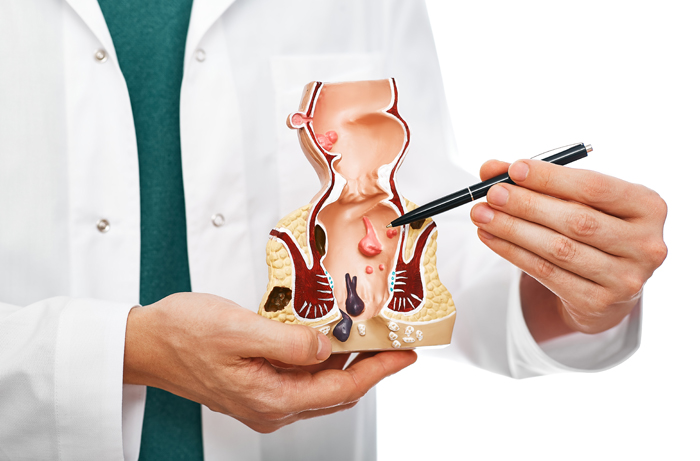Anal Fissures Treatment & Surgery in Alwarpet, Chennai
An anal fissure is a minor cut or a tear at the anus or anal canal lining, which can cause severe pain, bleeding and obstruct bowel movements. Sometimes, the cut can be deep enough to expose the surrounding muscle tissue of the anus, which may delay the healing. Mild anal fissures are usually treated quickly by taking certain medications and following a recommended diet. However, if the tear persists beyond 6 to 8 weeks, it is chronic and will require surgery. Therefore, early diagnosis is essential to avoid further complications.
For diagnosis and treatment, you can visit any of the gastroenterology hospitals in Chennai. Alternatively, you can search online for the best gastroenterologist near me.

What Are the Symptoms of Anal Fissures?
Symptoms of anal fissures include:
- Pain, itching, or deep burning sensation during or after bowel movements
- Discharge of blood on the stools
- Skin tag or lump near the anal tear
- Constipation and discomfort while urinating.
What Are the Causes of Anal Fissures?
Anal fissures are caused due to an injury or trauma to the anal canal or anus. The trauma induced is due to long-term diarrhea and constipation. Other potential causes may include:
- Colorectal diseases like ulcerative colitis, Crohn’s disease, and anal cancer
- Injury from pregnancy or childbirth
- Insertion of external objects into the anus.
- Decreased blood flow or scarring of the colorectal area
- Tight sphincter muscles that build up more pressure on the anal canal.
How is an Anal Fissure Diagnosed and When to See a Doctor?
If you experience any symptoms like blood on the stools or pain, consult a general surgeon near you and explain how you feel. The surgeon will examine the anus by conducting a digital rectal examination. If they feel anything unusual, they will recommend you to the best colorectal surgeon or gastroenterologist. They will further perform tests like anoscopy, sigmoidoscopy, and colonoscopy. These procedures involve inserting a tube into the anus or rectum to inspect the entire colon.
Request an appointment at Apollo Spectra Hospitals, Alwarpet, Chennai.
Call 1860 500 2244 to book an appointment.
What are the Complications of Anal Fissures?
Some complications of an anal fissure include:
- Recurrence of anal fissures.
- Chronic anal tear- If anal fissures cannot heal after eight weeks, it can lead to the formation of scar tissue at the fissure site.
- Anal fistulas- abnormal growth of tunnels that join the anal canal to other parts of the bowel.
- Anal stenosis- the anal canal becomes narrow because of the spasms and contractions of the scar tissues.
What are the Treatment Options for Anal Fissure?
If the anal fissures are diagnosed early, it is possible to heal the symptoms within a few weeks without surgery.
Non-surgical treatments:
- Laxatives
- Taking sitz baths for about 20 minutes several times a day helps relax the anal muscles and stimulate healing.
- Doctors may recommend using nitroglycerin ointments that increase blood flow to the fissures and help relax the sphincter muscles.
- Hydrocortisone suppositories or foams or creams help relieve the inflammation.
- Botulinum toxin injections temporarily immobilize the anal sphincter muscle to reduce spasms.
Surgical treatments:
For chronic fissures, surgery is the most effective treatment option. A colorectal surgeon will recommend surgery after examining your condition.
Lateral internal sphincterotomy: The surgery usually comprises cutting a small part of the anal sphincter muscle after administering general anesthesia. The goal of the surgery is to reduce pain and spasms and remove the associated scar tissue. Once the surgery is completed, pain is relieved within a few days, and you can completely recover and go back to work after 6-8 weeks.
Conclusion
An anal fissure is a tear at the lining of the anus. Around half of anal fissures heal by themselves with proper self-care and avoidance of constipation. However, chronic anal fissures may not heal because of scarring or muscle spasms of the internal anal sphincter muscle. Even after the surgery for chronic anal fissures, it is important to maintain a healthy diet to avoid recurrence.
No, anal fissures do not lead to or increase the risk of colorectal cancer. You may feel so because they have similar symptoms.
Most anal fissures are caused by chronic constipation and an increase in pressure. So avoid it by taking preventive measures like:
- Eating a high-fiber diet or taking fiber supplements.
- Drinking water or fluids frequently to soften the stools.
- Wiping gently after passing stool.
Approximately 1-6% of patients have a recurrence of their anal fissure after sphincterotomy if the surgery is performed improperly or incompletely. In addition, if you do not maintain good bowel habits and have a high-fiber diet, anal fissures have 30-70% chances of recurrence.
Symptoms
Our Top Specialities
NOTICE BOARD
CONTACT US
CONTACT US
 Book Appointment
Book Appointment


.svg)
.svg)
.svg)
.svg)








